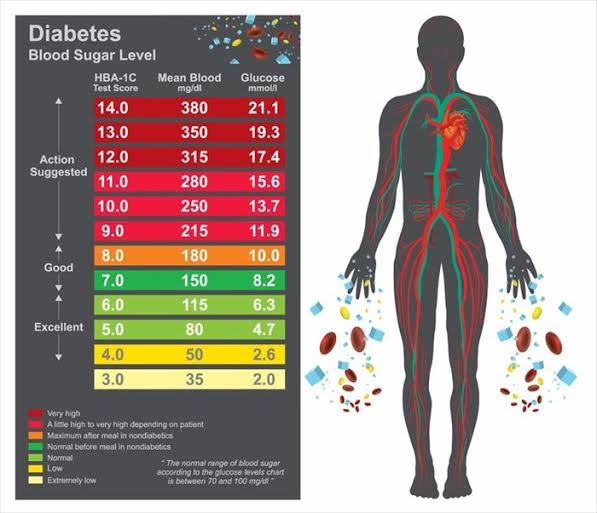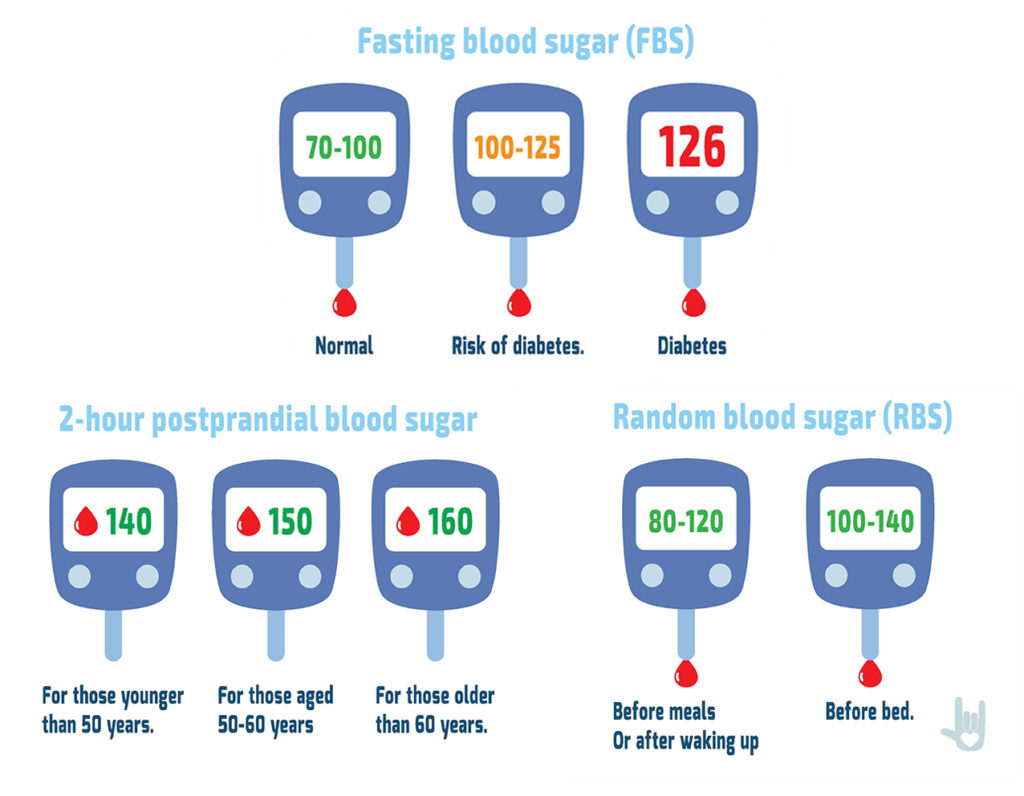
The normal blood sugar level and at a normal level is necessary for each of us to know to maintain his safety. Blood sugar is the sugar that the blood carries to all the cells of the body to provide it with the energy it needs. A person needs to maintain blood sugar levels in a safe range to reduce the risk of developing diabetes and cardiovascular disease.
The body gets sugar from the foods it eats, and the human body regulates blood glucose levels so that they always remain moderate, that is, enough glucose to nourish cells, but not too much of it, which causes diabetes.
And blood sugar levels change throughout the day, for example, blood glucose levels rise after eating, then stabilize again about an hour after eating, and are at their lowest levels before the first meal of the day.
What is glucose?
Glucose is the product of glycolysis in the body, and is the main source of energy in the body, which is carried by the blood to all parts of the body. When a person eats carbohydrates through their diet, the digestive system processes them and digests them into sugar molecules of different compositions. Complex carbohydrates such as the sugar lactose in dairy products are difficult for the body to break down, as they contain different types of sugar molecules.
Sugar passes directly from the digestive system into the bloodstream after a person has eaten and digested it. However, glucose can only enter the cells if there is an adequate amount of the hormone insulin also present in the bloodstream, which is responsible for making the cells ready to receive glucose. Cells will become hungry without enough insulin, or if they become resistant to its effects, which is known as diabetes.
The liver and muscles store excess glucose in the form of glycogen, which plays an important role in achieving homeostasis in the body, as it helps the body to function during starvation states. If a person does not eat for a short period of time, glucose concentrations in the blood will decrease, as the pancreas releases another hormone called glucagon, which works to break down stored glycogen into glucose, thus returning blood sugar to normal levels.
What is the blood sugar level?
Some health organizations, such as the American Diabetes Association and the Centers for Disease Control and Prevention, offer the following guidelines about normal blood sugar levels for people without diabetes:
random glucose measurement
Blood sugar is measured randomly throughout the day, that is, at any time without linking to eating times. Normal blood sugar levels are less than 200 mg/dL. If your random blood sugar levels are above 200 mg/dL, then you have diabetes.
fasting blood sugar
Measure your blood sugar while fasting, when it has been at least 8 hours since you last ate. The normal levels of sugar in the blood in this case is less than 100 mg / dL, while it is between 80-130 mg / dL in people with diabetes.
Blood sugar two hours after eating
Measure your blood sugar two hours after starting a meal, or two hours after eating any sugary liquid. Normal blood sugar levels in this case are less than 140 mg/dL, while it is less than 180 mg/dL in people with diabetes.
What are the causes of high blood sugar level?
Persistently high blood sugar is known as diabetes. High blood sugar usually occurs when there is not enough insulin in the body, or when the body’s cells are less sensitive to insulin. Common symptoms of high blood sugar include:
- Dry mouth.
- frequent urination.
- Increased feeling of thirst.
- Fatigue, dizziness and blurred vision.
- Headache and nausea.
High blood sugar may also cause insulin resistance, which reduces the sensitivity of cells to insulin and this leads to type 2 diabetes. The long-term complications of diabetes affect the small blood vessels that supply nerves, the kidneys, the retina of the eye, and other organs. And the constant rise in blood sugar causes some serious problems, such as:
- vision loss;
- Kidney disease.
- Erectile dysfunction in men.
- Diabetic foot
- Increased risk of heart attacks and strokes.

Why do blood sugar levels drop?
Hypoglycemia occurs when blood sugar concentrations fall below normal. People with diabetes are more likely to have low blood sugar levels. Symptoms of low blood sugar levels include:
- Twitching lips.
- Trembling hands and some other parts of the body.
- pale face .
- Excessive sweating.
- Palpitations or increased heart rate.
- dizziness or lightheadedness;
The main causes of low blood sugar levels are:
- Having diabetes.
- Some medicines, such as malaria treatments.
- Getting large doses of insulin.
- Some diseases such as acute hepatitis, and kidney disorders.
What can I do to control sugar levels?
Eating a healthy diet with plenty of fruits and vegetables, maintaining a healthy weight, and getting some physical activity regularly can help control blood sugar. There are some tips that will help with that, and they are as follows:
- Keep track of your blood sugar levels to see what makes them go up or down.
- Eat at regular times, and do not miss meals.
- Always choose foods that are low in calories, saturated fats, trans fats, and sugar, as these can all raise blood sugar levels.
- Drink water instead of juices or sweetened beverages.






